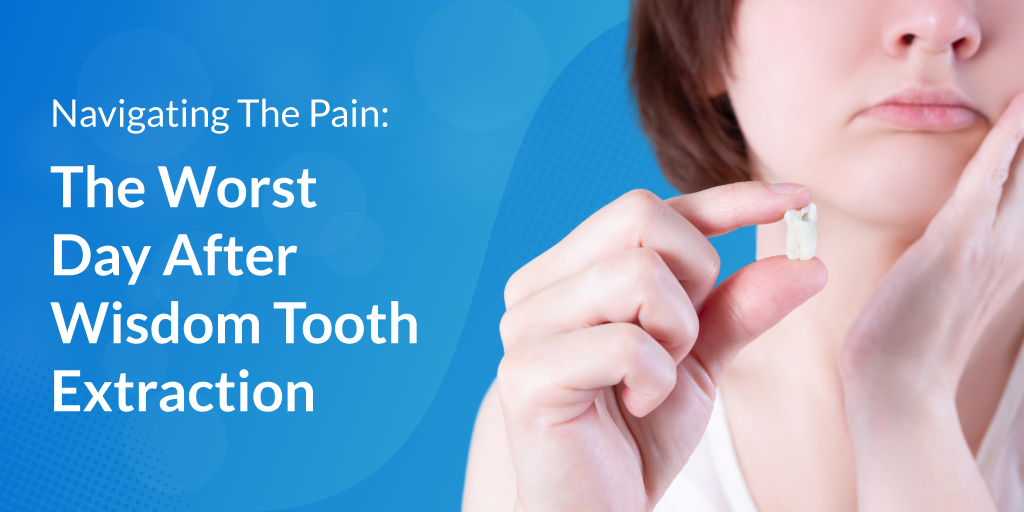
Tackling any dental procedure, especially wisdom teeth removal, can feel daunting. One common fear is the prospect of experiencing the worst day of pain after wisdom tooth extraction. However, preparation and understanding can help lessen these fears and ensure the best possible recovery.
If you’re frightened by stories about wisdom teeth removal, LA Dental is here to assist. The clinic is managed by Dr. Azy and Dr. Arezoo Nasiry, sisters providing exceptional dental services in a state-of-the-art facility. They bring their expertise and warm approach every time you visit.
Along with wisdom tooth procedures, LA Dental provides a wide array of general dentistry services. From regular check-ups to emergency procedures, the clinic delivers top-quality dental care that meets your specific needs.
The pain after wisdom tooth extraction can peak a day or two post-surgery. This is normal, but knowing this fact doesn’t make the experience any less bearable. The key is to manage this pain effectively. Start by following your dentist’s advice on pain relief medications. Don’t wait for the pain to become unbearable before taking medication. Instead, adhere to a schedule as directed by your dental professional.
Ice packs can be a godsend. Applying an ice pack to the jaw for 15 minutes on and 15 minutes off can significantly reduce pain. The cold helps numb the area, providing temporary relief. However, ensure you’re protecting your skin from direct exposure to ice to prevent skin damage. Stick to these strategies, and you’ll find that managing the peak pain day becomes a more manageable endeavor.
Swelling is a natural response to this kind of dental procedure and is most prominent during the first few days. To minimize swelling, continue using ice packs as described above. Keeping your head elevated, even while sleeping, can also help reduce swelling.
Managing discomfort goes hand-in-hand with reducing swelling. Soft foods and plenty of fluids will be your best friends during this period. Avoid anything too hot, spicy, or requiring much chewing. Gentle rinses with warm salt water, usually starting the day after the procedure, can aid in soothing the affected area. Remember, gentle is the operative word; vigorous rinsing can disturb the healing process.
Bleeding is expected after wisdom tooth extraction, but it should gradually decrease within the first 24 hours. Bite down gently on a gauze pad placed over the extraction site to help control bleeding. Change the gauze as it becomes soaked through, but always handle the extraction site with care to not disrupt the clot forming.
In terms of infection, keeping the extraction site clean is crucial. While you should avoid brushing directly on the site for a day or two, maintaining oral hygiene is vital for preventing infection. Follow your dentist’s instructions on how to clean your mouth post-surgery. They may prescribe an antibacterial mouthwash or suggest a saltwater rinse regimen.
After wisdom tooth extraction, choosing the right foods can greatly affect your healing process. Soft, easy-to-consume foods should make up the majority of your diet in the days following your surgery. Think smoothies, yogurt, soup, and applesauce. These foods provide the nourishment needed without straining your jaw or harming the extraction site. It’s also important to stay hydrated, but avoid using a straw. The suction action can dislodge the blood clot at the extraction site and delay healing.
On the other hand, certain foods can jeopardize your recovery. Hard, crunchy, or sticky foods can aggravate the wound area, so it’s best to avoid these until your dentist gives you the all-clear. Similarly, spicy and acidic foods can irritate the extraction site, leading to discomfort and slowing down the healing process. By focusing on what to eat and avoid, you can help ensure a smoother and quicker recovery.
Maintaining oral hygiene after wisdom tooth extraction is vital for preventing infection, but it requires a gentle approach. Initially, avoid brushing near the extraction site so as not to disturb the healing process. Your dentist may recommend gently rinsing your mouth with warm salt water a few times a day, starting 24 hours after the surgery. This can help keep the area clean without harsh contact.
As healing progresses, continue to brush your teeth gently with a soft-bristled brush, being cautious around the wounded area. Your dentist might also suggest an antibacterial mouthwash to use during the recovery period. This mouthwash helps eliminate bacteria without the need for vigorous rinsing that could disrupt the clot. Adapting your oral hygiene practices in this way can play a crucial role in your recovery after wisdom tooth extraction.
Sleeping well after wisdom tooth extraction can be challenging, yet it’s a critical part of the recovery process. The first hurdle many face is finding a comfortable position that also supports healing. Sleeping with your head elevated is recommended; this can reduce swelling and minimize discomfort. Utilizing a few extra pillows to prop up your head and shoulders can make a significant difference.
Another common issue is dealing with discomfort that interrupts sleep. If permitted by your dentist, taking pain relief medication before bedtime can help. Additionally, sticking to your prescribed pain management schedule ensures ongoing comfort throughout the night. Keeping a cold pack handy in case you wake up in pain can also offer quick, temporary relief. Focus on creating a calm, restful environment to make it easier to fall back asleep should you awaken. Soft lighting, minimal noise, and a comfortable temperature can facilitate deeper, more restorative rest.
Keeping well-hydrated is critical for healing after a wisdom tooth extraction, but doing so without putting pressure on the extraction site requires careful attention. Sipping water gently from a cup rather than using a straw minimizes the risk of dislodging the blood clot at the site of the extraction, which is key to proper healing. Keeping a water bottle nearby encourages regular sipping throughout the day, ensuring hydration without the need for suction. Water isn’t just vital for hydration; it also helps cleanse the mouth gently, reducing the risk of infection around the extraction site.
Another method is to consume foods with high water content. Foods like watermelon, broth-based soups, and smoothies (consumed with a spoon rather than through a straw) can contribute significantly to your daily water intake. These alternatives not only keep you hydrated but also offer the added benefit of nourishment when solid food intake might be challenging. By focusing on these hydration strategies, you can support the healing process effectively while avoiding actions that might compromise recovery.
After wisdom tooth extraction, scheduling follow-up appointments with your dentist or oral surgeon is vital. These appointments help your dental professional to monitor your healing progress, ensuring that the site is healing correctly and that there are no signs of infection. They can also provide personalized advice and adjustments to your recovery plan as needed. Ignoring or skipping these follow-up visits risks unnoticed complications, which could lead to longer recovery times or additional procedures.
Beyond assessing physical healing, these appointments are an opportunity to address any concerns or questions you might have about the recovery process. Whether it’s discomfort you’re experiencing, uncertainty about oral hygiene practices, or questions about when to resume normal activities, your dentist can provide guidance. Regular follow-ups are a proactive approach to your health, emphasizing prevention and early detection to ensure a smooth and efficient healing journey.
Effective pain management after wisdom tooth extraction is not one-size-fits-all. While over-the-counter pain relievers are commonly recommended, some individuals might require prescription-strength medications to manage their discomfort effectively. It’s important to communicate openly with your dentist about the level of pain you’re experiencing so they can tailor a pain management plan that’s right for you. Remember, managing pain is not just about comfort; it’s about reducing inflammation and supporting the healing process.
Don’t let the fear of pain from any dental procedure hold you back. With LA Dental, you will receive the highest standard of care. Contact us today to discuss your needs and take the first step toward a healthier smile.

LA Dental Clinic
3377 Wilshire Blvd #202
Los Angeles, CA, 90010